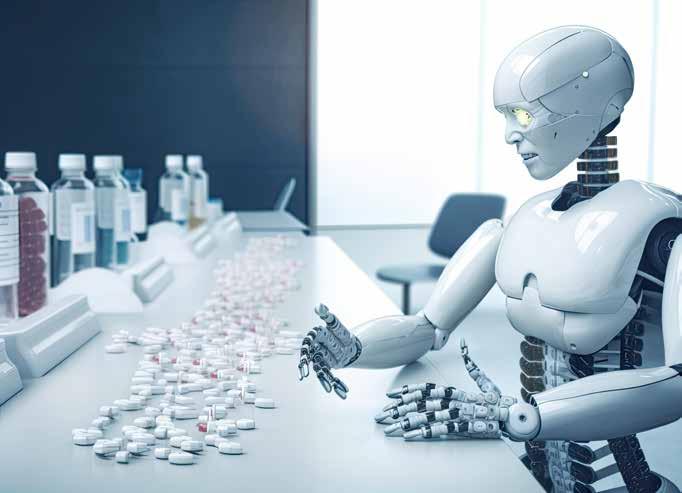
11 minute read
Artificial Intelligence in Drug Manufacturing and Drug Discovery
Artificial intelligence (AI) has revolutionized the pharmaceutical industry by providing innovative solutions in drug discovery, design, and manufacturing. In recent years, AI has become increasingly useful in drug manufacturing, offering several benefits such as increased speed, efficiency, accuracy, and costeffectiveness. AI techniques, such as machine learning, natural language processing, and deep learning, are being used to mine vast amounts of data and extract meaningful insights that aid in drug development.
Shamal Fernando Managing Director Slim pharmaceuticals (Pvt) Ltd
Advertisement
In drug discovery, AI is being used to predict the efficacy and safety of potential drug candidates, identify new therapeutic targets, and optimize clinical trial designs. By harnessing the power of machine learning algorithms, researchers can analyze vast amounts of biological data and identify patterns that are difficult to discern using traditional methods.
In drug manufacturing, AI is being used to optimize manufacturing processes, reduce costs, and ensure quality control. AI-powered predictive models can analyze data from multiple sources to identify potential issues and optimize production parameters, leading to faster and more efficient drug production.
In general, AI has the potential to revolutionize the pharmaceutical industry, leading to the development of safer and more effective drugs, personalized treatments, and improved patient outcomes. As the technology continues to advance, we can expect to see even greater breakthroughs in drug discovery and manufacturing in the years to come.
Here's a comprehensive analysis of the use of AI in drug manufacturing:
How useful is AI in drug manufacturing?
AI in drug manufacturing can improve the efficiency of the manufacturing process by predicting the best conditions for drug synthesis and optimizing manufacturing parameters. It can also help identify impurities in drugs, increasing the quality and safety of the final product. AI can also analyze large amounts of data to discover patterns and insights, enabling pharmaceutical companies to make better decisions regarding drug manufacturing. AI has proven to be highly useful in drug manufacturing, enabling pharmaceutical companies to optimize their manufacturing processes, improve quality control, and reduce costs. Some of the key benefits of using AI in drug manufacturing include:
Cost effectiveness
AI has the potential to reduce the costs of drug manufacturing by reducing the time and resources needed to develop new drugs. This is particularly important in the early stages of drug development, where AI can predict drug toxicity and efficacy, reducing the number of expensive clinical trials required. By optimizing production processes and reducing waste, AI can help pharmaceutical companies to lower their manufacturing costs. This can lead to more affordable drugs for patients and increased profitability for the company.
Optimizing production processes:
AI algorithms can analyze data from multiple sources, such as production sensors and batch records, to identify patterns and optimize production parameters. This leads to faster and more efficient drug production, with fewer errors and less waste.
Best medicines
AI can help identify the best medicines for specific patient populations by analyzing large amounts of patient data, such as genetic information and medical histories. This personalized approach to medicine can improve patient outcomes and reduce the likelihood of adverse reactions.
Accuracy
AI can significantly improve the accuracy of drug manufacturing by identifying potential manufacturing defects and providing real-time quality control. This reduces the likelihood of manufacturing errors, which can cause delays and increase costs.
Challenges
Despite its numerous benefits, the use of AI in drug manufacturing is not without its challenges. One of the biggest challenges is the lack of standardization in data collection and analysis, which can affect the accuracy and reliability of AI algorithms. Another challenge is the need for high-quality data, which can be time-consuming and expensive to acquire.
In general, AI has the potential to revolutionize drug manufacturing by increasing efficiency, reducing costs, improving accuracy, and enabling personalized medicine. However, to fully realize these benefits, pharmaceutical companies need to invest in high-quality data and standardize data collection and analysis. With these investments, AI can help pharmaceutical companies develop safer and more effective drugs, leading to better outcomes.
AI has become increasingly useful in drug discovery and manufacturing, offering several benefits such as increased speed, efficiency, accuracy, and costeffectiveness.
Drug discovery AI can significantly speed up the drug discovery process by analyzing large amounts of data and identifying potential drug candidates. This is particularly useful in the early stages of drug development, where
AI can predict drug toxicity and efficacy, reducing the number of expensive clinical trials required. AI algorithms can also identify new drug targets and pathways, leading to the development of innovative drugs.
AI is rapidly transforming the pharmaceutical industry, enabling companies to develop new drugs faster, more efficiently, and at a lower cost. AI is being used in drug manufacturing to optimize production processes, improve product quality, and reduce costs. AI is also being used in drug discovery to identify new therapeutic targets, design new drugs, screen potential drug candidates, and optimize drug properties.
In drug manufacturing, AI is being used to analyze vast amounts of data from sensors, cameras, and other sources to optimize production processes and improve product quality. AI-powered predictive models can identify potential issues and optimize production parameters, leading to more efficient production and higher yields. AI can also help identify potential quality issues before they become a problem, enabling operators to take corrective action before they result in quality problems. Additionally, AI can predict when equipment maintenance is needed, helping to prevent production downtime and reduce maintenance costs.
In drug discovery, AI is being used to analyze large datasets, including genomic and proteomic data, electronic health records, and scientific literature, to identify new therapeutic targets and design new drugs. AI can help researchers identify patterns and relationships in the data that may be missed by traditional methods, leading to the identification of new targets for drug development. AI can also help design new drugs by predicting how different molecules will interact with specific targets and screening large libraries of molecules to identify potential drug candidates. By using AI to optimize drug properties, researchers can predict how drugs will be absorbed, distributed, metabolized, and eliminated by the body, guiding the design of clinical trials. Generally, AI is transforming drug manufacturing and drug discovery, enabling companies to develop safer and more effective drugs, personalized treatments, and improved patient outcomes. As AI technology continues to advance, we can expect to see even greater benefits in the years to come.
Drug design AI can optimize

Drug design by predicting the best conditions for drug synthesis and optimizing manufacturing parameters. It can also help identify impurities in drugs, increasing the quality and safety of the final product. AI can also predict drug interactions with other drugs or with the human body, reducing the likelihood of adverse reactions. Drug design is one of the key areas where AI is making a significant impact. AI can help researchers design new drugs by predicting how different molecules will interact with specific targets and identifying potential drug candidates with the greatest likelihood of success. Here are some ways in which AI is being used in drug design:
Virtual screening: AI is being used to screen large libraries of molecules to identify potential drug candidates. By using machine learning algorithms to analyze highthroughput screening data, researchers can identify molecules with the greatest potential for efficacy and safety. AI can also help researchers design more efficient screening experiments by predicting which molecules are most likely to be active against a specific target.
Predictive modeling: AI is being used to predict how different molecules will interact with specific targets, predicting the binding affinity and identifying potential drug candidates with the greatest likelihood of success. By using machine learning algorithms, researchers can simulate the binding of molecules to target proteins, predicting the strength of the interaction and the likelihood of success.
Generative models: AI is being used to generate new drug candidates using generative models. These models use algorithms to generate new molecules that are optimized for specific properties, such as efficacy, safety, and pharmacokinetics.
Optimization: AI is being used to optimize drug candidates by predicting their pharmacokinetic and pharmacodynamic properties. By using machine learning algorithms, researchers can predict how drugs will be absorbed, distributed, metabolized, and eliminated by the body. This can help identify potential safety and efficacy issues and guide the design of clinical trials.
Overall, AI is transforming drug design by enabling researchers to analyze vast amounts of data and extract meaningful insights that aid in drug development. By using AI to accelerate drug design, we can expect to see the development of safer and more effective drugs, personalized treatments, and improved patient outcomes.
Cost effectiveness
AI has the potential to reduce the costs of drug discovery and manufacturing by reducing the time and resources needed to develop new drugs. This is particularly important in the early stages of drug development, where AI can predict drug toxicity and efficacy, reducing the number of expensive clinical trials required.
Best medicines AI can help identify the best medicines for specific patient populations by analyzing large amounts of patient data, such as genetic information and medical histories. This personalized approach to medicine can improve patient outcomes and reduce the likelihood of adverse reactions.
Accuracy AI can significantly improve the accuracy of drug discovery and manufacturing by identifying potential errors and providing real-time quality control. This reduces the likelihood of errors, which can cause delays and increase costs.
Challenges Despite its numerous benefits, the use of AI in drug discovery and manufacturing is not without its challenges. One of the biggest challenges is the lack of standardization in data collection and analysis, which can affect the accuracy and reliability of AI algorithms. Another challenge is the need for high-quality data, which can be time-consuming and expensive to acquire. AI has the potential to revolutionize drug discovery and manufacturing by increasing efficiency, reducing costs, improving accuracy, and enabling
Personalized medicine
However, to fully realize these benefits, pharmaceutical companies need to invest in high-quality data and standardize data collection and analysis. With these investments, AI can help pharmaceutical companies develop safer and more effective drugs, leading to better patient outcomes.
Collaborative AI:
Collaborative AI involves combining the expertise of humans and machines to solve complex problems. In drug manufacturing, collaborative AI could be used to identify potential drug candidates and optimize manufacturing processes. By working together, human experts and AI algorithms can come up with better solutions than either could on their own.
Continuous learning:
One of the strengths of AI is its ability to learn and improve over time. Continuous learning algorithms can adapt to changing conditions and improve their accuracy with each new data point. In drug manufacturing, continuous learning could be used to optimize manufacturing processes and improve drug quality over time.
Biomarker discovery:
AI is being used to discover new biomarkers, which are measurable indicators of a biological state or condition. By analyzing large datasets, such as genomic or proteomic data, AI can identify biomarkers that are associated with specific diseases or treatment responses. This can help clinicians identify patients who may benefit from a specific treatment or monitor treatment response.
Predictive maintenance:
Predictive maintenance uses machine learning algorithms to predict when equipment is likely to fail, allowing maintenance teams to address issues before they become serious. In drug manufacturing, predictive maintenance could help reduce downtime and ensure that equipment is running at optimal levels.
Personalized medicine:
Personalized medicine involves tailoring treatments to individual patients based on their genetic makeup and medical history.
AI algorithms can analyze large amounts of patient data to identify potential drug interactions and predict which treatments are likely to be most effective. In drug manufacturing, personalized medicine could lead to the development of drugs that are more effective and have fewer side effects. AI is transforming drug discovery and personalized medicine by enabling researchers to analyze vast amounts of patient data and extract meaningful insights that aid in the development of personalized treatments. By using AI to develop personalized medicines, we can expect to see improved patient outcomes and more effective treatments for a wide range of diseases and conditions.
In conclusion, the integration of artificial intelligence (AI) in drug manufacturing and drug discovery has the potential to revolutionize the pharmaceutical industry. AI has already demonstrated its ability to significantly accelerate the drug discovery process by reducing the time and cost required to bring new drugs to market, while also improving the accuracy and efficiency of drug design.
AI has also shown promise in developing personalized medicine, allowing clinicians to tailor treatment plans to the specific characteristics of each patient. By analyzing vast amounts of patient data and extracting meaningful insights, AI can help identify patient subgroups that may benefit from specific therapies and predict how patients will respond to different treatments. In drug manufacturing, AI has the potential to improve the efficiency and quality of the manufacturing process, reducing costs and increasing production capacity. By analyzing data from manufacturing processes, AI can identify opportunities for optimization and predict potential issues before they occur, improving product quality and reducing the risk of recalls.
While there are still challenges to overcome, such as the need for more comprehensive data sets and the integration of AI into existing drug discovery and manufacturing workflows, the potential benefits of AI in pharmaceuticals are undeniable. As the field continues to develop and evolve, we can expect to see continued advancements in drug discovery and personalized medicine, bringing new treatments to patients faster and more efficiently than ever before.
However, there are still challenges to be addressed, such as the need for comprehensive and diverse data sets, robust algorithms, and ethical considerations surrounding the use of AI in healthcare. Additionally, the integration of AI in drug discovery and manufacturing workflows may require significant investment and changes to existing practices.
The integration of AI in drug manufacturing and drug discovery has significant potential to transform the pharmaceutical industry. As AI continues to evolve and become more sophisticated, we can expect to see several advancements in this field in the coming years. One prediction is that AI will become more integrated into drug discovery workflows, enabling faster and more efficient drug development. AI can also help researchers identify new drug targets and design drugs with greater accuracy and precision, leading to the development of more effective treatments.
Another prediction is that AI will enable the development of personalized medicine, tailored to the unique characteristics of each patient. By analyzing patient data and genetic information, AI can help predict how individuals will respond to different treatments, enabling clinicians to select the most effective treatment for each patient.
Additionally, AI can optimize drug manufacturing processes, improving efficiency and reducing costs. AI can help identify opportunities for process optimization and predict potential issues before they occur, improving product quality and reducing the risk of recalls.
In summary, the continued development and adoption of AI in drug manufacturing and drug discovery are essential for the future of healthcare. We can expect to see several advancements in this field in the coming years, leading to the development of more effective treatments, improved patient outcomes, and a more efficient healthcare system.
Conclusion
Nevertheless, the benefits of AI in drug discovery and manufacturing are clear. It can enable the development of innovative treatments, improve patient outcomes, and address some of the major challenges facing the pharmaceutical industry. As such, the continued development and adoption of AI in drug discovery and manufacturing are crucial for the future of healthcare, and we can expect to see ongoing advancements and breakthroughs in this area in the coming years.
Shamal Fernando is currently working as a Managing Director at Slim Pharmaceuticals (Pvt) Ltd. He is Purpose Driven Marketer, Finance and Business Leader who gets energized by the opportunity to impact patients and people Business leader with experience in a broad range of therapeutic areas including oncology, Haematology, Rheumatology, women's health, neuroscience, cardiovascular, endocrine, and infectious diseases. Proven expertise in the on-time and within-budget delivery of innovative strategies.











